

Colonsay 1968.
COLONSAY EXPEDITION 1968
Leader: Alan Bateman
List of officers and boys to follow hopefully.
Brian Clegg
LEADER'S REPORT
For the third
successive year, the Junior Expedition spent two weeks on the west coast
of Colonsay: that fact is significant because it is our usual policy to
vary the sites, so that officers and boys have the greatest possible
chance of visiting as many Hebridean islands as possible. As it turned
out, only one of the entire company had been to Colonsay before,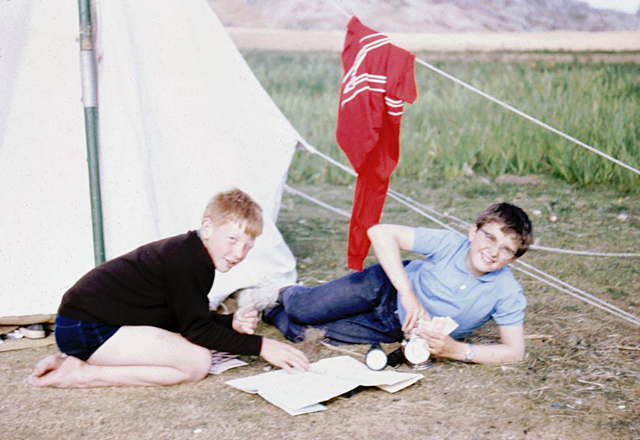 so we were able to view this much-praised island with unbiased eyes. In
retrospect, I can only repeat all the praises that have been heaped upon
it since we first went there. The site has so many advantages for the
Junior expedition— it is easy (too easy?) of access; climbing, sailing and
canoeing are within a few minutes' walk from the marquee, while the whole
island can be visited within a day—or very nearly, as those who were
stranded on Oronsay discovered! It is true that the beach is exposed to
the south-west, but once again the weather was near-perfect throughout,
and the spring, the "tobar fuar" after which the bay is named, will surely
flow until some latterday Celtic Saint decides otherwise. During our stay,
it was virtually the only drinking water still available on the south of
the island.
so we were able to view this much-praised island with unbiased eyes. In
retrospect, I can only repeat all the praises that have been heaped upon
it since we first went there. The site has so many advantages for the
Junior expedition— it is easy (too easy?) of access; climbing, sailing and
canoeing are within a few minutes' walk from the marquee, while the whole
island can be visited within a day—or very nearly, as those who were
stranded on Oronsay discovered! It is true that the beach is exposed to
the south-west, but once again the weather was near-perfect throughout,
and the spring, the "tobar fuar" after which the bay is named, will surely
flow until some latterday Celtic Saint decides otherwise. During our stay,
it was virtually the only drinking water still available on the south of
the island.
It will be clear
that, as before, the Colonsay expedition proved successful, and from a
Director's point of view, it was especially pleasing to find that the boys
were such a splendid collection. I hope we shall see many of them in
future years, because we were rid of the card-playing-in-the-Icelandic
types which have been known to feature on previous expeditions! In
passing, it is worth noting that we were the largest expedition yet, with
twenty-nine boys from fifteen schools, including Choir, Comprehensive,
Grammar, Preparatory and Public varieties!
| Paul and Gary outside the tent on
Colonsay. Photo: Brian Clegg |
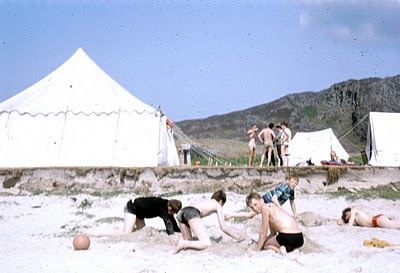
Apart from the natural advantages of the site, Colonsay
has another asset in that one can get to know the islanders very well
also—they deserve all the respect with which they are held by the
S.H.S., for on an expedition where arguments rarely occur, much is due
to their help, friendly interest, and composed calm which infect us so
much in all that we do.
And what did
we do, apart from lying in the sun? Fuller reports on some subjects
will follow this report, but here are a few facts which will show what
went on from day to day:
Vinga
was used for sailing and fishing on all but two of the days, one of
which was the last, and the other the date of the “Round the Island"
walk. We were able to leave her anchored in the bay, and all agreed
that she was ideal for our purposes. We had four canoes, all of which
seemed to be in general use, even if canoeing turned out to be harder
work than some of the newcomers had realised. Roger went off on a
canoe bivouac, and also organised the races, which were deservedly (?)
won by Nicholas and Peter.
Rock-climbing parties were out on the hills as often as possible under
the care of the two Charles and Mark.
| On the beach Photo by Brian Clegg |
|
Only two boys
couldn't be fitted into the "night away from camp" that proved most
popular, although I remain unconvinced that these trips were always
undertaken in the spirit which keen camping types might expect! However,
they do allow a valuable escape from the fairly organised life at camp, as
well as demonstrating to the non-schoolmasters amongst the officers how
incredibly casual boys can be!
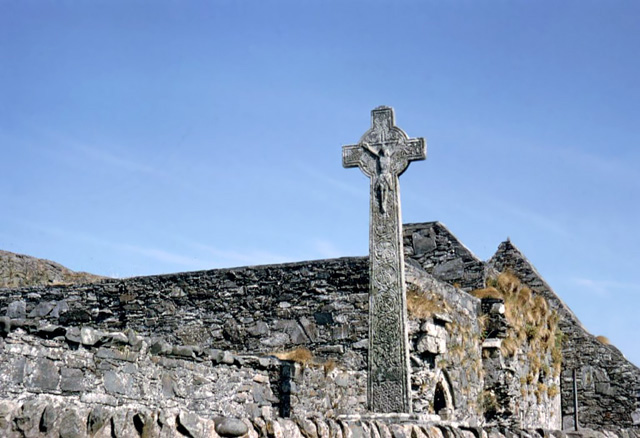
| Celtic cross on Oronsay.
Photo by Brian Clegg |
All the
interesting parts of the island were explored, outstanding among which
were the Neolithic caves that have recently been discovered near Kiloran
Bay. Such was the inspiration of that trip, that three boys spent the
night there - and returned without a ghost story.
Of project work
as it is understood on the Senior expeditions, there was very little, much
to the indignation of Paul Gill, but that seems to be the way of the
younger groups, who have more interest in pottering and exploring than the
others. In time, they will want that urge to be channelled into more
disciplined study, but there seemed little desire for it amongst our
group. At all events, bored people were rare specimens, and I remain
certain that one of the great strengths of the Society lies in our easy
approach to life: the chances are there, boys at a loose end can be
prodded into things, but it is really up to each individual to take his
opportunities.
We mixed our
activities with those of the islanders, as could be judged from the
hundred or so people at the party in our marquee. Roger played and sang at
the concert and ceilidh; we lost both the football matches, but they were
close things; we had revenge in the cricket; while our prayers were taken
by both the Baptist and Church of Scotland ministers. So friendly was the
island that I soon realised that I must adjust my ideas as to what S.H.S.
expeditions were like, but the more informal mixing soon settled down and
hardly interrupted the daily programme. The contact we make with the
islanders is one of the best things we do, because only in that way can we
really feel that we know the islands on which we stay. It is one of the
things that mark us out from other groups of a similar type, such as the
Scouts, who often seem to prefer to keep to themselves, although 1 cannot
believe that to be their official policy.
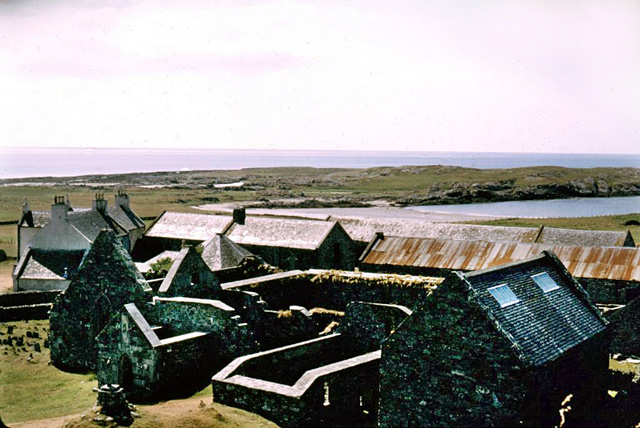
Once again, the
Hebrides worked their message of peace and friendliness into the lives of
us all, and more than one new officer commented on the amazing effect
Colonsay seemed to have on the behaviour and general cooperation of the
boys—familiar enough to some of us, but it does seem that strong-arm
tactics, on the whole, are only necessary in the wrong environment. All of
us who have led expeditions must have remembered that fact after returning
to our modern lives, in which we sometimes seem powerless to effect our
surroundings.
As the
Locheil sailed towards the blue hills of Jura and home, we all
looked back on two weeks of interest and excitement, with new friends made
and lessons learnt. I am sure we all felt we had come to know Colonsay as
well as would be possible in so short a time, physically, intellectually
(thanks largely to Tony's quiz, won by Section 1), and most of all,
personally. An island none of us will forget.
My praise goes
to all the Officers and boys—I hope I shall see many of them again—and all
our thanks go to Lord Strathcona, to Dr. and Mrs. Halt Gardiner who proved
as helpful as it would be possible to be, and to all those on holiday or
resident on Colonsay, whether they met us in the pub, gave us rabbit or
lobster to brighten the rather ordinary menu, or were just the people who
waved from cars to us all. I know many of us want to return, and wish them
well as they settle into the comparative isolation of another winter.
Alan Bateman
|
View of Oronsay, Photo: Brian Clegg |
Brian Clegg was on this
trip to Colonsay, this Blog was one of the few articles I found about the S.H.S
when I searched the internet, reproduced here by his kind permission.
Friday, 1
October 2010
Have young people lost out because of fear?
 |
| On the beach,
Colonsay |
When I was twelve I had one of
the best holidays of my life. It was a school trip, or more accurately
an inter-school trip arranged by an unlikely body called the Schools
Hebridean Society. For two weeks, I joined a bunch of other boys and
various leader types in a camp on a beach on the remote-ish island of
Colonsay.
It was absolutely fantastic. First there was the opportunity to
experience life in a community that was probably 50 years behind the
mainland. Though this wasn't in any sense a religious trip, we attended
church each week (once each in the two island churches), because that's
what people on the island did. Once a week we attended a
ceilidh in the
island's hall - Scottish dancing compulsory, but still somehow fun.
As I've discovered on other islands, you couldn't walk down a road
without the next passing car stopping and offering you a lift. Most
exciting (if terrifying) was getting a lift with the island's doctor. He
generally drove his landrover off road, and twice I witnessed him
driving with one hand while using a shotgun to take potshots at rabbits
with the other. (And they say mobile phones are dangerous.)
It was remarkable. I'm generally not a great fan of the bagpipes, but
one evening, as we were sitting on the white sand beach, a bagpipe was
heard faintly in the distance - the piper came over the dunes and passed
by us: quite magical.
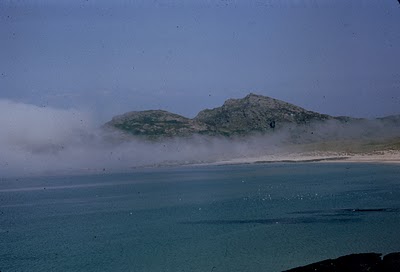 |
| Mist rising as
we emerge from the cave |
One last example of the experience. We all were
expected to bivouac somewhere away from camp in groups of three or four
sometime during the fortnight. Some caves had recently been rediscovered
on the island (they were known in Victorian times, but had somehow been
mislaid), and we'd had a visit to them.
Our team of three decided to bivouac in one of the caves that was
reputed to be haunted. (Well, sort of. A Victorian dog had allegedly
gone through a small aperture in the back of the cave. It re-emerged
yelping about an hour later with its tail singed after an encounter with
Old Nick.) I have to confess we went to sleep with the Tilley lamp
alight - but it was an experience I wouldn't have missed for anything.
Now, first of all, they probably wouldn't allow 12 year-olds to go off
on an all-male camp. They certainly wouldn't let us do the kind of
activities we did. And as for three of us camping overnight in a cave...
I understand why people are so protective of children, but there are
times when a tiny risk could be repaid by a huge adventure.
Brian Clegg
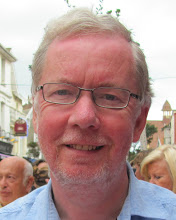 |
- Author of Light Years, A Brief
History of Infinity,
- The God Effect, Upgrade Me,
Ecologic,
- Before the Big Bang, Inflight
Science,
- Build Your Own Time Machine and
Gravity.
|



 so we were able to view this much-praised island with unbiased eyes. In
retrospect, I can only repeat all the praises that have been heaped upon
it since we first went there. The site has so many advantages for the
Junior expedition— it is easy (too easy?) of access; climbing, sailing and
canoeing are within a few minutes' walk from the marquee, while the whole
island can be visited within a day—or very nearly, as those who were
stranded on Oronsay discovered! It is true that the beach is exposed to
the south-west, but once again the weather was near-perfect throughout,
and the spring, the "tobar fuar" after which the bay is named, will surely
flow until some latterday Celtic Saint decides otherwise. During our stay,
it was virtually the only drinking water still available on the south of
the island.
so we were able to view this much-praised island with unbiased eyes. In
retrospect, I can only repeat all the praises that have been heaped upon
it since we first went there. The site has so many advantages for the
Junior expedition— it is easy (too easy?) of access; climbing, sailing and
canoeing are within a few minutes' walk from the marquee, while the whole
island can be visited within a day—or very nearly, as those who were
stranded on Oronsay discovered! It is true that the beach is exposed to
the south-west, but once again the weather was near-perfect throughout,
and the spring, the "tobar fuar" after which the bay is named, will surely
flow until some latterday Celtic Saint decides otherwise. During our stay,
it was virtually the only drinking water still available on the south of
the island. 
